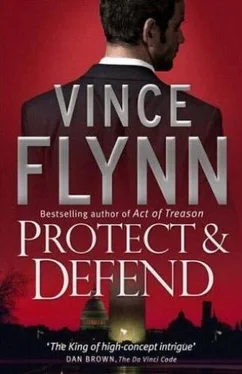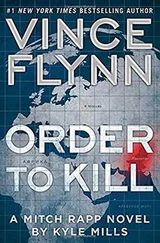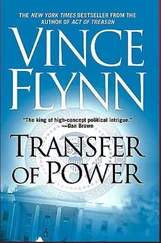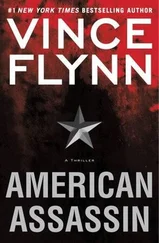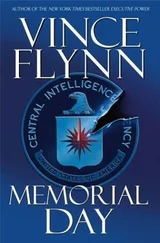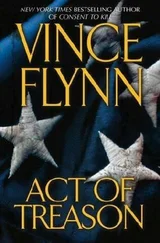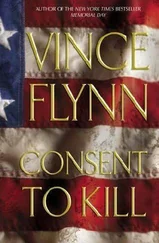“Why on God’s green earth would they fire on their own ship?” Byrne asked.
“Because they want to make it look like we did it,” the president answered.
“Exactly,” England agreed. “The task force commander is sending the contact tapes as well as footage of the Iranian ship being hit.”
CIA Deputy Director O’Brien entered the room looking harried. “Mr. President, I just spoke to Rapp. He has confirmation that Kennedy’s kidnapping was an Iranian operation.”
The room went silent. The president asked, “What kind of confirmation?”
“One of the prisoners has confessed that he’s a member of the Quds Force. For lack of a perfect analogy, that means he’s Iranian special forces. He identified one of the other prisoners as his commanding officer, and the third he says is a member of Hezbollah.”
The president looked around the room at the other members of his National Security Team. “So this was no random attack by local insurgents?”
“No, sir, in fact we have an even more damning piece of evidence.” O’Brien looked over his shoulder and nodded to a tech who had followed him into the conference room. A series of photos appeared on one of the large plasmas. O’Brien pointed to the photo in the upper left corner and said, “These were surveillance shots taken of Iranian Intelligence Minister Ashani as he landed in Mosul this morning.” The deputy director pointed to a second photo. “Here he is shaking hands with our deputy director of operations, Near East Division. On the far left of the frame you can see a man walking in the opposite direction.” O’Brien’s finger moved to the second row. “This man walking right here toward the police vehicles.”
“Rapp took this photo,” O’Brien said, pointing to the last one, “and showed it to one of the prisoners, who did not know the man’s name but said he arrived in Mosul this morning and took over the operation to kidnap Director Kennedy. The man Rapp has been interrogating”-O’Brien looked down to consult a piece of paper-“a Corporal Tahmineh, says he was not told who they were kidnapping. Only that this man was adamant that it was a woman and she be taken alive.”
The president looked angrily at the screen. “Who is he?”
“It’s Imad Mukhtar, sir, the head of Hezbollah’s paramilitary wing.”
The president stared at the screen in absolute disbelief at the Iranians’ audacity. “You’re sure?”
O’Brien looked at the president with a partially dazed expression. “Well, sir, this information is coming in pretty fast, so we haven’t had the chance to source it properly. In fact the only photo we have of Mukhtar is nearly thirty years old.”
“So you’re not sure,” the president said with no attempt to hide his irritation.
“Let me explain further. Mitch called Minister Ashani and asked him who…”
The president interrupted, “Mitch called Minister Ashani directly?”
“Yes, sir.” O’Brien cleared his throat and said, “After the prisoner,” the deputy director stopped to consult his notes.
An irritated president Alexander said, “Corporal whoever…I don’t care what his name is. Tell me about Mitch’s conversation with Ashani.”
O’Brien looked extremely nervous about his next words. “Mitch told Ashani he was going to hunt him down and kill him unless Irene was released within the hour.”
“Good,” Secretary of Defense England announced.
Other members of the National Security team looked less enthused.
“How did Ashani react?” the president asked.
“This is where it gets a little tricky. Mitch said Ashani seemed genuinely surprised by the whole thing.”
“What do you mean, surprised?” The president pointed at the screen. “He rode in on the same helicopter as this Mukbar, or whatever his name is.”
“All I’m doing is relaying what Mitch told me. He thinks there’s a chance Ashani was kept in the dark.”
“Or he’s trying to save his own ass,” England said.
“Maybe,” replied O’Brien, “but he’s the one who identified the man as Mukhtar.”
“Can we corroborate that info with another source?” asked the president.
“Mitch is working on that right now.”
The president was about to ask how, and then he thought better of it. Instead, he clenched his jaw in anger and said, “I can’t believe they had the gall to launch this operation right under our noses, and think we wouldn’t find out.”
“I’m not sure we would have found out, sir, if Mitch hadn’t taken those prisoners.” This was O’Brien’s way of attempting to say he had been wrong about trying to put a leash on Rapp.
“Maybe not,” the president mused. Turning to the secretary of defense, the president asked, “What’s their endgame? What are they trying to accomplish?”
“I’m not sure. This isn’t exactly rational behavior.”
“Sympathy, sir,” announced Secretary of State Wicka as she walked up to the group, twirling her trademark reading glasses in her right hand. “I just had a very enlightening conversation with France’s foreign minister. He says he received a call from Iran’s foreign minister claiming that his country is under attack by the U.S. He requested that France sponsor a resolution in the UN condemning the attack and asking that the U.S. pay reparations for both the vessel and the nuclear facility at Isfahan. He urged that the UN Security Council hold an emergency session to vote on this issue. He said if the UN didn’t take care of the problem, OPEC would.”
“Oh God,” Byrne moaned. “We’d better find a way to defuse this before oil prices shoot past a hundred dollars a barrel.”
“Prices will snap back as soon as this thing is over,” England said dismissively. “The important thing is to make sure this damn Iranian sub doesn’t sink any of our ships, and that we get Director Kennedy back as soon as possible. I think the way to do that is to turn up the heat on these guys. I think you should hold a press conference and put the facts out there, and I think you should consider laying down an ultimatum for the release of Kennedy.”
“What kind of ultimatum?” the president asked.
“I would consider calling her kidnapping an act of war.”
“Whoa…” Byrne put his hands up in a cautionary manner. “I know this is going to sound callous to some of you, but it has to be said.” The chief of staff looked at the other key advisors. “Maybe this is the price we have to pay for taking out their nuclear program.”
“Ted,” England sneered, “we had nothing to do with taking out that facility.”
“I know…but we benefited from it.” Byrne could tell by the expressions on everyone’s face that they were not buying his rationale. “All I’m saying is that before we rush off to war, we take a look at the big picture. Losing one person in exchange for making sure Iran doesn’t get the bomb is not a bad deal.”
Secretary of State Wicka’s normally calm demeanor turned to one of overt irritation. In a voice laced with sarcasm, she said, “I think that is great advice, Ted. In fact maybe I could call Iran’s foreign minister and work out a prisoner exchange. You could take Irene’s place, and then we could just write you off.”
Before Byrne could respond, the White House press secretary entered the room and announced that President Amatullah was about to begin a press conference. The attention of everyone in the room shifted to the wall of large plasma TVs. All but one showed the bearded and tieless Iranian president stepping to the podium.
MOSUL, IRAQ
Rapp walked the hallway in front of the cells in an attempt to jog loose a strategy that he could use to interrogate the other two prisoners. Just knowing their names went a long way toward getting some honest answers out of them, but there was a bigger problem. If either man knew where Mukhtar planned to take Kennedy, the odds were that she was no longer there. Mukhtar would surely know by now that the two men had not made it back to the rallying point, which in turn would alert him to the possibility that his location was soon to be compromised.
Читать дальше
